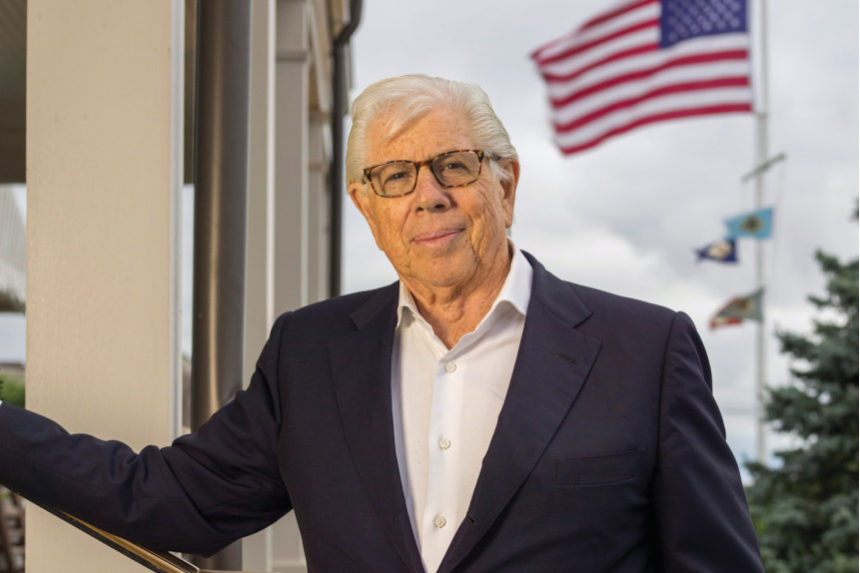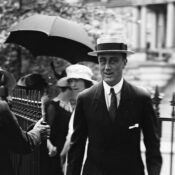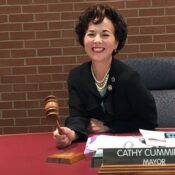Carl Bernstein has written more stories than he can count, won a Pulitzer Prize, and influenced history. Now the reporter who became a legend after he and Bob Woodward blew the Watergate scandal wide open in The Washington Post is looking back to his beginnings in the new book Chasing History: A Kid in the Newsroom. The memoir chronicles his early years in the newspaper business. It’s a revealing look at a kid who seemed to have a dim future until he stepped into the press room at The Evening Star looking for a job.
He started as a copy boy when they discovered he was a whiz at typing. For five years he had a wild and eventful apprenticeship. He learned from some top journalistic mentors how to “get the facts” under pressure. Ironically, without a college degree, he was never hired by the Star as a reporter, but he writes that he learned the lesson that has defined his career as an investigative journalist: “I’d gotten it into my head that all good reporting is pretty much the same thing: the best version of the truth you can come up with.”
Jeanne Wolf: Here I am talking to one of the world’s top journalists, but your book focuses not on the big events that made you famous but on your early years in journalism.
Carl Bernstein: I wrote in the voice of me as a kid, not the old man looking back. The book ends in 1965, so it’s about a different time in America and a different time in journalism. It doesn’t include Watergate.
I’m a second-generation native of Washington, D.C. My mom was born there, and the effects of the Civil War still covered our existence in [the 1960s], but nobody remembers. There are very few people even aware in this country that Washington, the Washington I grew up in, was a Jim Crow town. I went to legally segregated public schools in the capital of the United States until Brown v. The Board of Education. When I was in sixth grade, in 1954, our swimming pools were drained by the recreation department to keep black and white kids from swimming together.
At 16, I had one foot in a classroom, one foot in a pool hall, and one foot in juvenile court. My dad got me an interview at The Evening Star, hoping I could get a job and stay out of trouble. They led me through the newsroom, and suddenly I was in the middle of this glorious commotion — typewriters clacking, people yelling, telephones ringing. A copy boy came by with a load of newspapers and handed me one. It was still warm, just off the presses. I looked around and said, “I want to be a newspaper man.” And that’s the beginning of my incredible journey. I think becoming a reporter saved my life. The real thrill I got is still there. It’s about meeting people, not in the office, encountering and dealing with real people, talking to them, learning about their lives.
Now, I hear reporters ask a lot of questions that are intended more to manufacture controversy than to get at what Bob Woodward and I call “the best obtainable version of the truth.” We’ve used that phrase so often over the last 50 years since the Watergate break-in. It had its origin at The Washington Star. There was a responsibility to go after the truth in all its complexity. And I think that notion of the complexity of the truth is essential to what we do.
I hear a lot of people say, “Too many reporters are prejudiced. They write what they already believe.” I think the problem is a little different than that. There are too many reporters who have a preconceived notion of what the story is and don’t do the research, not for nefarious ideological reasons, but from laziness. I’ve done a lot of stories. Not one has really turned out exactly like my preconceived notion of what I expected it to be. Here’s a problem that we now run up against: the age of the internet and virtual information gathering. You’re not going to get a story by googling it. Google is one of the great tools that I wish I had had. But you’ve got to get out there. Your head and your feet are your best tools.
JW: What I discovered in your very personal book is how much fun you had and how much passion you feel about the news. Do you think reporters now are as devoted? What do you think of journalism now?
CB: I think the journalists are there. I think there’s an awful lot of great reporting going on. And in fact, I would say that probably the Trump presidency represents the greatest reporting of a White House, of a presidential administration by the largest number of news organizations in my lifetime. Reporters were doing fabulous work, and in books too. Look what we know about the Trump presidency and about Donald Trump. Where do we know it from? We certainly don’t know it from people in Congress. We don’t know it from people who worked with him in the White House. We know it from these reporters. So I’m not too worried about the reporters. We got plenty of great reporters.
The question is whether or not we have the new institutions committed to that best obtainable version of truth and whether we have great editors and publishers who say to their reporters, “Get the hell out of the office, do the hard work.”
Our job is not to bring about a certain political or ideological result. It’s not. Our job is to get the information out there. And hopefully, especially in a great democracy, people will come to pretty much the right decisions, or they’ll have a knowledgeable debate about what’s happening. That’s not happening in this country now.
JW: The mood of the country seems so pessimistic and divided. What the media is giving them doesn’t seem to help that.
CB: I can’t give you a percentage, but my gut and anecdotally and my observation makes me pretty certain that half the country is not interested in the truth. They’re interested in reinforcing what they already believe — their politics, their religious beliefs, their philosophies, their ideologies. It’s nothing new. I remember that, at the beginning of Watergate, most people didn’t believe what Bob and I were writing about it. Most people thought Nixon would never do that stuff. Gradually, as we presented more and more information, and as Nixon’s criminal mindset in Watergate became more and more evident, more people became open to that truth.
I think the only consensus in the country about which a huge majority of our people will agree is that they think we’re heading in the wrong direction, whatever that means. And yet the wrong direction for one side is not the wrong direction for the other side. We’ve been in what I call a cold civil war in this country. It didn’t begin with Donald Trump. It’s been going on for a long time.
Our history in this country is such that we’ve been able, pretty much, to agree on real existential conditions out there. I mean, look at the great debate in the formation of this country, the Federalist debate, which was vicious on both sides, with name calling on both sides, a kind of electricity to the argument between the two sides in the Federalist debate. But what all of them agreed on was the basic landscape of the colonies, what the problems were, what the relationship to the Crown had brought about. There was an agreement on what should be debated. And we don’t have anything like a consensus of just the conditions at this point.
JW: You’ve given a lot of advice to journalists what they need to do better as reporters. What do you say to the average guy who just thinks he can have no effect on any of this, somebody who looks up to you and sees your success?
CB: I’m not sure. I think that there is a pessimism about the future of the country that I have in part of me — not all of me — that is different than what I felt the rest of my life up until very recently. I’m not all the way there yet. I still believe in the promise of this country, the kind of eternal renewal that we’ve been able to do. After the Civil War, we had Reconstruction, and then we had a terrible period when all of the rights that had been given to freed slaves were taken away again in many ways. You look at the civil rights movement, you look at the women’s movement, you look at the gay rights movement, you look at the union movement in this country, and you see a lot of two steps forward, one step back.
But we keep going the second step forward, and my hope is that we are going to find a way out of this morass that we’re in and find that next step forward. It’s going to take a hell of a lot, maybe some event that unites the people. You would think the pandemic would have done it rather than divide us further. We’re in a state of fragility in this country, a state at once fragile and explosive that I think we haven’t been in since the Civil War.
JW: Let’s go back to chasing history in your life. You have been famous, and we all write about the ups and downs of fame. What were the ups and downs and what still are the ups and downs of being in the public eye?
CB: I’ve had a great life. There have been ups and downs. The low point was right after Watergate, when my marriage blew up and I was responsible for ending it. Then my ex-wife Nora Ephron made Heartburn, a movie about it. It was a terrible time for me. Fortunately, we made our peace.
I think that what you learn as you get older is to look introspectively, hopefully figuring out what’s worked and what’s not working. You look inward, you try to see what it is deep inside that really means the most to you — change direction if you have to, acknowledge your mistakes.
And so I think, happily, I made it through that period and came out the other side. And now I have a wonderful family — two great kids, one of whom is a reporter at The New York Times and the other a guitarist who is on his way to becoming a rock star.
This is an extended version of an interview that was published in the March/April 2022 issue of The Saturday Evening Post. Subscribe to the magazine for more art, inspiring stories, fiction, humor, and features from our archives.
Featured image: Jonathan Becker
Become a Saturday Evening Post member and enjoy unlimited access. Subscribe now




Comments
This is an interesting interview to be sure, Jeanne. Insights of Carl’s background as a boy and young man that concludes in 1965, still mid-century. The questions also give his valid insights into the current divisions in this country that unfortunately are worsening by the day.
I’m glad that there was discussion and acknowledgement of some of the great political reporters and journalists we have today. My favorite is Jonathan Karl and all of his investigative reporting on the previous President. His new book ‘Betrayal: The Final Act of the Trump Show’ covers everything and then some. The cover itself clearly depicts the 1/6/21 insurrection.
I was just wondering Mr. Bernstein, if you’ve ever met or had the chance to speak with Mr. Karl? I’m not trying to make light of Nixon (and his administration’s) criminal activities. One of the biggest ironically was Nixon taking the U.S. off of the Gold Standard in mid-1971.
It ended the post-World War II economy for the average American forever. Not over night, but certainly 1973 onward with the OPEC crisis, stagnant wages, rich or poor extremes and more.
That was one of Nixon’s worst decisions, yet isn’t talked about. Watergate seems to have created the mentality and reality that the President IS above the law and have been at a point where he can do anything and get away with it. Well before that, nearly every Presidency within my lifetime has ended in tragedy, burn-out, humiliation or failure.
Just a couple of months into the 1st grade, JFK was assassinated which set off events that got Nixon elected, then re-elected. As a person whose never known the U.S. NOT under turbulent conditions, I have to ask you if you still feel Nixon was the worst at this late date? This includes Biden’s disastrous Presidency so far, of course.
Isn’t it possible that Watergate is so ingrained in you, that it will always be the worst, no matter what? With all due respect (and I do respect you and Bob Woodward) I get the feeling Watergate is your baby, your legacy, you want to ‘protect’ no matter what. It’s understandable, but your legacy IS secure I assure you.
Now might be a good time to talk or write a new book about subsequent Presidents and how much worse many have been. A lot of really much dirtier ‘water’ has occurred since then.
I’d like to hear your viewpoint comparing and contrasting Nixon and Watergate with the 9 Presidents since, unless it goes against a personal narrative you’d rather leave alone. If so, that’s your choice. Still, this 50th anniversary seems like the right time to get down to the nitty-gritty though, for a new balanced perspective on Watergate.
Interesting observations above by Midnight Rider. Jamie Ruskin in his new book UNTHINKABLE (great read, by the way) noted how, in a conversation with another US congressperson he asked him what the difference was between how they saw America. The congressperson told Raskin, ‘you see America as the two coasts; I see it as everything in between.’ That is a profound observation. As one who lives in a small-town in rural Midwest, I wouldn’t exchange the quality of life I enjoy here with anyone whose life is spent fighting traffic, being invisible, not knowing neighbors, and having everything cost so much more than it does here. With more time to spend on important things, like reflecting on life in general and one’s place in it, the possibility of making a real difference is not only increased but soul-satisfying.
I agree with Mr. Bernstein. The country has long been divided in two different ways. The first is the “Cold War” as he refers to between South and North. But the other which I felt he overlooked is the divide between Rural/Small Town versus Urban/City dwellers. Many of these Urban/City dwellers have a tendency to turn their noses up to those of us living in Rural, Farm, Ranch, Small Town settings. They deem us as being slow, ignorant, unsophisticated and generally lagging behind in intelligence and what’s going on in our state, country, and world. They have a disdain for our riding 4-wheelers, off road motorcycles, horses, and hunting deer, wild boar, etc. they don’t consider you to measure to their standards unless you belong to some large country club or church or you don’t golf or play tennis on a frequent basis. I know what I’m talking about because I grew up in that kind of environment where the city folks in Chattanooga and Nashville looked down on the good people in Dunlap, Whitwell, Pikeville, Woodbury, Smithville, etc. just because of where they lived. It’s pretty sad and yes it still happens today.